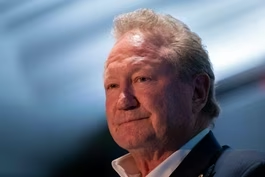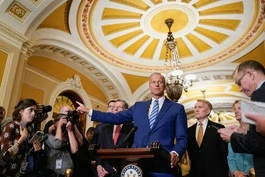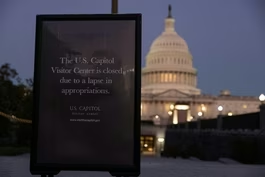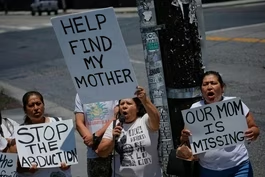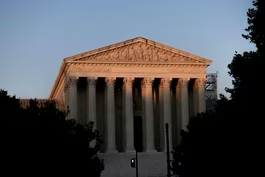
How students are faring in Arizona's voucher program
Clip: 10/15/2025 | 8m 23sVideo has Closed Captions
How students are faring in Arizona's voucher program that could be adopted nationwide
As the Trump administration throws its weight behind a national school voucher program that it says will give parents more options, critics point to the negative impacts school choice is having on public schools. Arizona introduced the first universal school voucher program in the country in 2022, and it may provide clues for what’s to come. Stephanie Sy reports on how the program is faring.
Problems playing video? | Closed Captioning Feedback
Problems playing video? | Closed Captioning Feedback
Major corporate funding for the PBS News Hour is provided by BDO, BNSF, Consumer Cellular, American Cruise Lines, and Raymond James. Funding for the PBS NewsHour Weekend is provided by...

How students are faring in Arizona's voucher program
Clip: 10/15/2025 | 8m 23sVideo has Closed Captions
As the Trump administration throws its weight behind a national school voucher program that it says will give parents more options, critics point to the negative impacts school choice is having on public schools. Arizona introduced the first universal school voucher program in the country in 2022, and it may provide clues for what’s to come. Stephanie Sy reports on how the program is faring.
Problems playing video? | Closed Captioning Feedback
How to Watch PBS News Hour
PBS News Hour is available to stream on pbs.org and the free PBS App, available on iPhone, Apple TV, Android TV, Android smartphones, Amazon Fire TV, Amazon Fire Tablet, Roku, Samsung Smart TV, and Vizio.
Providing Support for PBS.org
Learn Moreabout PBS online sponsorshipAMNA NAWAZ: As the Trump administration throws its weight behind the national school voucher program that it says will give parents more educational options, critics point to the negative impacts that school choice is already having on public schools.
Arizona introduced the first universal school voucher program in the country back in 2022, and it may provide clues for what's to come.
Stephanie Sy takes a look at how the program is faring.
STEPHANIE SY: This may look like a typical school, but it's actually a weekly gathering of homeschooled students.
KAITLYN REDFIELD-ORTIZ, PATH Collective: Friday's our fun days.
We really wanted this to be focused on enrichment.
STEPHANIE SY: Kaitlyn Redfield-Ortiz, a former lawyer, and Brooke Bentley, a real estate agent, started PATH Collective in 2024.
KAITLYN REDFIELD-ORTIZ: Brooke and I have seven kids combined, and we have been parenting for over a decade.
So we had met and found the best yoga teacher and the best chess coach and the best robotics teacher.
And so we really wanted to bring them together and have a fun day for our kids that was led by expert, professional teachers.
STEPHANIE SY: The program is one of the results of Arizona's universal school voucher program called Empowerment Scholarship Accounts, or ESA.
ESAs direct public funds to parents to pay for things like home education expenses or private or parochial school tuition.
Over 90,000 students are currently enrolled in the state, up from about 11,000 before the program expanded to cover all Arizona students in 2022.
KAITLYN REDFIELD-ORTIZ: Taking ESA has been a real gift for our family, a real blessing, because there are so many things that my kids can do now that they might not have been able to do without ESA, that we can make -- I can make their education curated to exactly my child's interests, their abilities, what they're ready for.
STEPHANIE SY: The majority of ESAs are between $7,000 and $8,000.
That money can be used for programs like PATH Collective, which charges $285 a month per student.
Redfield-Ortiz, also a former educator, started teaching at home during the COVID crisis.
And were there things about public school prior to COVID that you didn't like, that you didn't think were serving your kids?
KAITLYN REDFIELD-ORTIZ: Yes, I was very worried about bullying in schools.
I was very worried about school safety.
STEPHANIE SY: State Superintendent of Public Instruction Tom Horne has long supported school choice.
Which schools and homeschools are allowed to accept ESA funds from families?
TOM HORNE, Arizona Superintendent of Public Instruction: Well, there are no restrictions.
STEPHANIE SY: Anyone?
TOM HORNE: Yes.
STEPHANIE SY: So I could start a school with no teaching qualifications and get money from families in Arizona, taxpayer money, taxpayer money?
TOM HORNE: If there are parents crazy enough to send their kids to you.
The assumption -- now, this was the legislative decision, not my personal decision.
STEPHANIE SY: Right.
TOM HORNE: But the legislative decision was parents are the ones that know best for their kids.
STEPHANIE SY: Horne argues that school choice will force public schools to be better.
TOM HORNE: I'm not talking about competition in the sense of schools failing.
I'm talking about competition in the sense of administrators and teachers being motivated to do their best.
And, by and large, government monopolies are not efficient and -- or in the case of schools, they don't necessarily do their very best.
STEPHANIE SY: Arizona students have long had a lot of options when it comes to what schools they can attend.
But all of those choices haven't necessarily led to academic gains.
Arizona is often near the bottom when it comes to student achievement.
And the nearly $1 billion ESA program has come under fire for what critics say is a lack of guardrails.
RAQUEL MAMANI, Save Our Schools Arizona: So, if we're talking about competition, it's just not a fair competition.
STEPHANIE SY: Raquel Mamani is a public schoolteacher in Phoenix and an organizer with Save Our Schools Arizona, which has been fighting privatization in school since 2017.
RAQUEL MAMANI: If we're talking about using taxpayer dollars and healthy competition, then we should all be playing by the same rules.
They should be accepting every student that presents to their door, just like in a public school.
You should have clear and transparent accountability for how you use the money.
STEPHANIE SY: Local news reports have covered various instances of misuse, and the attorney general's office has convicted several people in connection with schemes to defraud the voucher program.
Mamani says public dollars should prioritize raising pay for public schoolteachers.
Arizona also ranks almost last in the nation for per-pupil spending.
RAQUEL MAMANI: I as a teacher would love to see 90 percent of the funding being prioritized for our public schools.
STEPHANIE SY: The Deer Valley Unified School District in Northwest Phoenix is an A-rated district, but even here, Superintendent Curtis Finch sees what he calls educational experimentation since universal vouchers became available.
Often, the kids come back when the experiment fails.
CURTIS FINCH, Superintendent, Deer Valley, Arizona, Unified School District: What we find is that, since they aren't doing the state standards, there's a lot of Internet curriculum that you can buy that says, oh, we're following the state standards.
But when they come back, they obviously are not.
And they don't realize the pace at which the public school student is under for learning.
When they come back, they're often behind.
And so it takes more resources for me and my team.
STEPHANIE SY: While the universal ESA program is intended to give students of all socioeconomic backgrounds access to more options, since its start, the majority of the ESA program's participants have lived in higher-income zip codes.
More recent data has shown a slight shift to middle-class areas.
Ninth grader Xavier Dudley used to attend a charter school.
XAVIER DUDLEY, Ninth Grade Student (through translator): I had bad days almost every day and I was always getting into trouble a lot.
STEPHANIE SY: Using ESA funds, his mom, Tiffany, switched him to this so-called microschool.
It was launched by the Black Mothers Forum to create a supportive educational space for Black children.
TIFFANY DUDLEY, Mother of Xavier Dudley: This is a private school, and so, without that ESA, I wouldn't be able to pay that tuition.
And so it is allowing me to put him in this smaller private school setting so he can get that one-on-one attention that he needs, having somebody that actually looks like him that understands his thought process and help him walk through the emotions or whatever academic challenges that he faces.
STEPHANIE SY: Here, the students learn online in a classroom, and the adults in the room are called coaches, instead of teachers.
TIFFANY DUDLEY: If you look at the education system, especially out in Arizona, our children are not doing very well.
They're falling further and further behind, and this is with our certified teachers.
STEPHANIE SY: Do you think this is the best possible education that your kids can get in Arizona?
TIFFANY DUDLEY: I think it is the best for my children now.
I don't really think there is a one-size-fits-all when it comes to education, because children learn differently.
STEPHANIE SY: As more and more parents make the choice to find better fits for their kids, the superintendent in Deer Valley, Curtis Finch, says he sees school choice as another point of polarization.
CURTIS FINCH: I'm the canary in the coal mine.
I can tell him what's it going to be 10 years from now, because I'm living it.
STEPHANIE SY: And the warning you're sounding is what?
What are you singing, canary?
CURTIS FINCH: Yes, yes.
(LAUGHTER) The warning is that it's not good for our society.
I don't care what it is.
Any time you take groups out of society and they form their own systems, it's not good for society.
And when we don't know our neighbors, where does that come from?
That's coming from unplugging from the community systems.
And one of them is public schools.
STEPHANIE SY: After decades of debate, the tide is clearly turning towards school choice; 18 states have now followed Arizona's lead, expanding their voucher programs to be universal.
For the "PBS News Hour," I'm Stephanie Sy.
Billionaire mining executive betting on green energy
Video has Closed Captions
Clip: 10/15/2025 | 5m 54s | Why a billionaire mining executive is betting on green energy (5m 54s)
Democratic, GOP strategists on political fallout of shutdown
Video has Closed Captions
Clip: 10/15/2025 | 8m 16s | Democratic and GOP strategists on the political fallout of the government shutdown (8m 16s)
Federal workers on how the shutdown is upending their lives
Video has Closed Captions
Clip: 10/15/2025 | 8m 4s | Federal workers describe how the shutdown is upending their jobs and daily lives (8m 4s)
News Wrap: Pakistan, Afghanistan agree to ceasefire
Video has Closed Captions
Clip: 10/15/2025 | 5m 16s | News Wrap: Pakistan and Afghanistan agree to a 48-hour ceasefire after days of clashes (5m 16s)
Palestinians return to ruins where homes once stood
Video has Closed Captions
Clip: 10/15/2025 | 8m 18s | Palestinians return to ruins where homes once stood as Israel awaits remains of hostages (8m 18s)
What justices signaled in Supreme Court redistricting case
Video has Closed Captions
Clip: 10/15/2025 | 7m 21s | What the justices signaled in a Supreme Court case that could reshape electoral maps (7m 21s)
Providing Support for PBS.org
Learn Moreabout PBS online sponsorship
- News and Public Affairs

FRONTLINE is investigative journalism that questions, explains and changes our world.

- News and Public Affairs

Amanpour and Company features conversations with leaders and decision makers.












Support for PBS provided by:
Major corporate funding for the PBS News Hour is provided by BDO, BNSF, Consumer Cellular, American Cruise Lines, and Raymond James. Funding for the PBS NewsHour Weekend is provided by...
